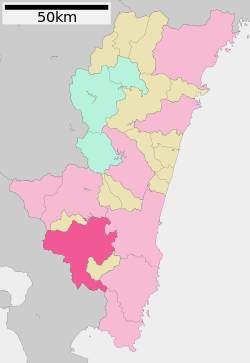Miyakonojō
|
Miyakonojō 都城市 |
||
|---|---|---|
| City | ||

View of downtown Miyakonojo, from Miyakonojo Castle Ruin Park
|
||
|
||
 Location of Miyakonojō in Miyazaki Prefecture |
||
| Location in Japan | ||
| Coordinates: 31°43′N 131°4′E / 31.717°N 131.067°ECoordinates: 31°43′N 131°4′E / 31.717°N 131.067°E | ||
| Country | Japan | |
| Region | Kyushu | |
| Prefecture | Miyazaki Prefecture | |
| Government | ||
| • Mayor | Makoto Nagamine | |
| Area | ||
| • Total | 653.31 km2 (252.24 sq mi) | |
| Population (November 1, 2012) | ||
| • Total | 168,072 | |
| • Density | 257.26/km2 (666.3/sq mi) | |
| Symbols | ||
| • Tree | Japanese zelkova | |
| • Flower | Iris | |
| • Flowering tree | Camellia sasanqua | |
| Time zone | Japan Standard Time (UTC+9) | |
| City hall address | 6-21 Himegichō, Miyakonojō-shi, Miyazaki-ken 885-8555 |
|
| Website | www |
|
Miyakonojō (都城市 Miyakonojō-shi?) is a city in Miyazaki Prefecture, Japan. The city was founded on April 1, 1924.
As of November 1, 2012, the city has an estimated population of 168,072, with 70,549 households and a population density of 257.26 per km². The total area is 653.31 km² making it the largest city in the prefecture in terms of area.
On January 1, 2006, the towns of Takajō, Takazaki, Yamada and Yamanokuchi (all from Kitamorokata District) were merged into Miyakonojō.
Miyakonojō is known as the birthplace of the Shimazu Estate, the largest shōen (estate or manor) of medieval Japan. In the 1020s, a powerful official named Taira no Suemoto developed a small manor named Shimazu-in. Expanded substantially in the first half of the 12th century, it eventually covered large portions of Satsuma, Ōsumi and Hyūga Provinces. In 1185, Koremune no Tadahisa was appointed as jitō of the Shimazu Estate and thereafter claimed the clan name of Shimazu. It is said that one of Tadahisa's residences, called Iwayoshi Gosho, was located at Miyakonojō. Between the Muromachi period and Edo period, the Hōngō family, which was a branch family of the Shimazus, controlled the area. After the Boshin War, it became one of the cities to abolish the han system. In 1871, it became a prefecture for a year.
...
Wikipedia


